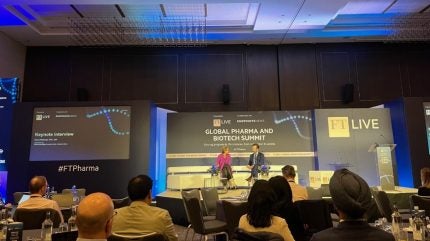
Following Donald Trump’s re-election as the 47th President of the United States, the global healthcare community is beginning to examine the potential implications for the pharmaceutical industry and public health policy.
In particular, Trump’s indication that Robert F Kennedy (RFK) Jr. – a prominent vaccine sceptic – could potentially play a significant role in his administration has raised questions about the future of vaccine policies in the US.

Discover B2B Marketing That Performs
Combine business intelligence and editorial excellence to reach engaged professionals across 36 leading media platforms.
At the Financial Times (FT) Global Pharma and Biotech Summit in London on 6 November, GSK CEO Emma Walmsley addressed these concerns and underscored the critical role of the US in GSK’s operations. “The US is extremely important to GSK,” Walmsley stated. “We’re a global company, but more than half of the business is in the US, we’re very heavily invested there, with factories in many states. It is by far the most important market to bring our innovation to first.”
Walmsley noted that GSK has successfully collaborated with previous US administrations, including during the Covid-19 pandemic. While she remains optimistic about GSK’s capacity to innovate and navigate potential shifts, Walmsley acknowledged that the company will have to work constructively with the administration. “Let’s see what happens in terms of who is appointed into what kind of role in the administration,” she said.
GSK, known for developing vaccines against infectious diseases like shingles and influenza, has also been actively advancing new vaccines, including the recently approved respiratory syncytial virus (RSV) vaccine for older adults. Although vaccines constitute a substantial part of GSK’s portfolio, Walmsley emphasised that the company has more to offer than just that: “Vaccines is a big part of our business. It’s not actually the biggest part of our business, medicine is the biggest part and is growing at 20% so far this year,” she explained.
In light of RFK Jr.’s “make America healthy again” mantra, Walmsley said: “Actually, making America healthy again is a really good idea. This is a country where the average life expectancy is four years below the average in the Organisation for Economic Co-operation and Development (OECD).” Walmsley pointed to declining vaccination rates in the US as an area of concern, observing that 38 states currently report lower rates of vaccination than in 2019.

US Tariffs are shifting - will you react or anticipate?
Don’t let policy changes catch you off guard. Stay proactive with real-time data and expert analysis.
By GlobalDataReflecting on the need for constructive dialogue around vaccines, Walmsley spoke about the importance of transparency and presenting scientific data. “Number one is transparent, adult-to-adult communication around the facts. Of course, vaccines are a much sharper question, because you’re dealing with injecting healthy people – often babies. Parents have questions.”
“You don’t just shout, trust us. You bring the facts forward, and I hope that science and truth will prevail,” concluded Walmsley.




